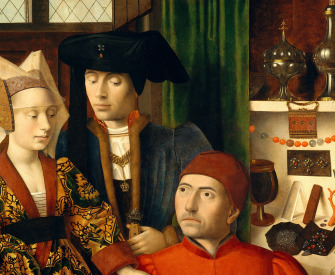War is fear cloaked in courage.
—William Westmoreland, 1966What Are They Afraid Of?
Notes from a neighbor.
To the people of the United States:
The U.S. government has been wrong, not just a few times, in its foreign policy. When this has occurred, it’s been because it made a mistake in the man it backed up. History gives us ample examples of this.
In the first half of this decade, the U.S. government made a mistake backing Carlos Salinas de Gortari. It made a mistake signing NAFTA, which lacked the support of the majority of the North American people, and which spelled a summary execution of Mexico’s indigenous people.
On the dawn of 1994 we rose up in arms. We rose up not seeking power, not in response to a foreign mandate. We rose up to say, “We are here.”
The Mexican government, our government, had forgotten us and was ready to perpetrate a genocide without bullets or bombs; it was ready to annihilate us with the quiet death of sickness, of misery, of oblivion. The U.S. government became the accomplice of the Mexican government in this genocide. With the signing of NAFTA, the U.S. government acted as guarantor of—and gave its blessing to—the murder of millions of Mexicans. Did the people of the United States know this? Did they know that their government was signing accords of massive extermination in Mexico? Did the people of the United States know that their government was backing a criminal?
That man left. We remained. Our demands had not been met, and our weapons kept saying, “We are here,” to the new government, to the people of Mexico, to the people and governments of the world. We waited patiently for the new government to listen to us and pay attention to us.

Young Mother Fleeing with a Child in Her Arms (detail), French school, nineteenth century. © RMN-Grand Palais / Art Resource, NY.
But within the dark circles of U.S. power, someone decided that we, the insurgent indigenous people of the Mexican southeast, were the worst threat to the United States of America. From the darkness came the order: Get rid of them! They put a price on our brown skin, on our culture, on our word—but above all they put a price on our uprising. The U.S. government decided, once more, to back a man who continues the politics of deceit of his predecessor, who denies the people of Mexico democracy, freedom, and justice. Millions of dollars were lent to that man and his government. Without the approval of the American people, an enormous loan—without precedent in history—was granted to the Mexican government. Not to improve the living conditions of the people, not for the democratization of the country’s political life, not for economic reactivation promoting factories and productive projects—this money was for speculation, for corruption, for simulation, for the annihilation of a group of rebels—indigenous for the most part—poorly armed, poorly nourished, ill-equipped, but very dignified, very rebellious, and very human.
So much money to finance deceit can only be explained by fear. But what does the U.S. government fear? The truth? That the North American people realize that their money is helping to back the oldest dictatorship in the modern world? That the North American people realize that their taxes pay for the persecution and death of the Mexican indigenous population?
What are the North American people afraid of? Should they fear our wooden rifles, our bare feet, our exhausted bodies, our language, our culture? Should they fear our shout that demands democracy, liberty, and justice? Aren’t these three truths the foundation that inspired the birth of the United States of America? Aren’t democracy, liberty, and justice rights that belong to all human beings?
How many millions of dollars can justify that any one human being, in any part of the world, be denied the right to be free to think and to bring about words and actions, free to give and receive that which he justly deserves, free to elect those who govern him and enforce the collective goals?
Shouldn’t the North American people instead fear money, modern weapons, the sophisticated technology of drug trafficking? Should the North American people fear the complicity between drug trafficking and governments? Shouldn’t they fear the consequences of the single-party dictatorship in Mexico? Shouldn’t they fear the violence that the lack of freedom, democracy, and justice irrevocably brings about?
Today the U.S. government—which for decades has prided itself in promoting democracy in the world—is the main support of a dictatorship. Sooner or later, in spite of the support of the U.S. government, in spite of the millions of dollars, in spite of the tons of lies, the dictatorship that darkens the Mexican sky will be erased. The people of Mexico will find the ways to achieve the democracy, liberty, and justice that is their historical right.

Subcomandante Marcos
From “From Vietnam to Chiapas, Twenty Years Before.” After the Zapatista National Liberation Army staged a rebellion in southeastern Mexico to demand indigenous rights and land reform, the federal government labeled Subcomandante Marcos, the group’s leader, a terrorist; more than 100,000 demonstrators marched in Mexico City in support of him. “The best wall against massive immigration to the U.S.,” he writes later in this letter, composed while hiding in the Lacandon jungle, “is a free, just, and democratic regime in Mexico.”




